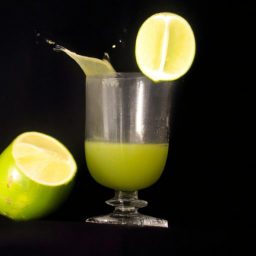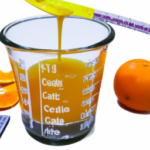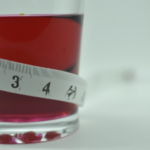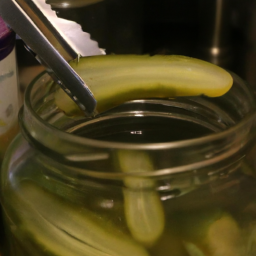As someone who pays attention to what I eat and drink for my health, I am always looking for information on the nutritional value of my food and beverages. Pineapple juice is a favorite drink of mine, but I am curious about its carbohydrate content. Carbohydrates are important for providing energy to our bodies, but they can have negative effects on our health if consumed in excess.
In this article, we will explore the nutritional value of pineapple juice, the amount of carbs it contains, and its effects on our health. Pineapple juice is a sweet and tangy drink made from the fruit of the pineapple plant. It is a good source of vitamins and minerals, including vitamin C, potassium, and magnesium. However, it is also high in sugar and calories, which can be a concern for individuals who are watching their carbohydrate intake.
Understanding the amount of carbs in pineapple juice can help us make informed decisions about how much we consume and how it fits into our overall diet and health goals.
Key Takeaways
- Pineapple juice is high in carbohydrates, with an 8-ounce serving containing around 30 grams of carbs.
- Pineapple juice has a glycemic index of 46, which means it can cause a moderate increase in blood sugar levels.
- Excessive intake of pineapple juice, high in carbohydrates, can lead to negative health effects like weight gain and increased risk of diabetes.
- It’s important to balance carbohydrate intake with other macronutrients and choose low-carb alternatives like water, herbal tea, or low-sugar fruit juices.
Nutritional Value of Pineapple Juice
You’ll be happy to know that pineapple juice isn’t just delicious, but it’s also packed full of nutrients! For example, it’s a great source of vitamin C, which boosts the immune system and fights infections. Pineapple juice is also rich in manganese, which helps with bone health and the metabolism of carbohydrates and protein. Additionally, bromelain is an enzyme found in pineapple juice that helps break down proteins and has anti-inflammatory properties.
Despite its numerous benefits, pineapple juice does have some potential drawbacks. One major concern is its high sugar content, which can contribute to weight gain and potentially lead to health problems such as diabetes. It’s important to consume pineapple juice in moderation and keep track of your recommended daily intake of sugar.
Moving on to understanding carbohydrates, it’s important to note that pineapple juice isn’t just high in sugar, but also in carbs.
Understanding Carbohydrates
When you’re trying to maintain a healthy diet, it’s important to understand how different types of nutrients, like carbohydrates, impact your body. Carbohydrates are a macronutrient that are found in many foods and are a major source of energy for the body. However, not all carbohydrates are created equal.
Here are three things to keep in mind when it comes to understanding carbohydrates:
-
Carbohydrate sources: Carbohydrates can come from a variety of sources, including fruits, vegetables, grains, and processed foods. It’s important to choose sources that are high in fiber and other important nutrients, like vitamins and minerals.
-
Low carb diets: Some people choose to follow a low carb diet for various reasons, such as weight loss or managing blood sugar levels. It’s important to note that not all low carb diets are created equal, and it’s important to consult with a healthcare professional before making any major dietary changes.
-
Balance is key: While it’s important to be mindful of your carbohydrate intake, it’s also important to remember that carbohydrates are an important source of energy for the body. Balancing your intake with other macronutrients, like protein and healthy fats, is key for maintaining a healthy and well-rounded diet.
Understanding carbohydrates is an important part of maintaining a healthy diet. Now that we’ve covered this topic, let’s dive into how pineapple juice is made.
How Pineapple Juice is Made
To make pineapple juice, it’s important to first select ripe pineapples, which should weigh around 3-5 pounds each. Pineapple cultivation requires a warm and humid climate, which is why it is commonly grown in tropical regions.
Once the pineapples are harvested, they are typically transported to a processing facility where they are washed, peeled, and cut into small pieces. Juice extraction techniques vary, but most involve crushing the pineapple pieces and then separating the juice from the pulp. Some companies add water, sugar, or other ingredients to the juice, so it’s important to read the label to know exactly what you’re drinking.
It’s fascinating to think that it takes about 1.5 pineapples to make a 16 oz glass of pineapple juice! Pineapple juice is a refreshing and healthy drink choice, but it’s important to be aware of its serving size and carbohydrate content.
In the next section, we’ll explore these topics in more detail.
Serving Size and Carbohydrate Content
Don’t miss out on the important details of your favorite drink – be mindful of the serving size and sugar content in pineapple juice. Pineapple juice is a tasty drink that’s enjoyed by many, but it’s important to pay attention to the serving size and carbohydrate content.
Here are some carbohydrate counting tips to help you make informed choices when it comes to enjoying this tropical beverage:
-
A typical serving size of pineapple juice is 8 ounces, which contains around 30 grams of carbohydrates. It’s essential to measure this amount to avoid consuming more carbohydrates than you intend to.
-
Be mindful of added sugars, as many store-bought pineapple juices contain added sweeteners that can increase the sugar content. Consider making your own pineapple juice at home using fresh pineapple to control the amount of sugar that goes into your drink.
-
Pair pineapple juice with a protein or healthy fat to slow down the absorption of carbohydrates, which can help regulate blood sugar levels.
Now that you know the importance of serving size and carbohydrate content, let’s discuss the glycemic index of pineapple juice.
Glycemic Index of Pineapple Juice
Get ready to experience a burst of sweetness as you sip on a glass of pineapple juice, but be aware of its impact on your blood sugar levels since it has a glycemic index of 46. This means that drinking pineapple juice can cause a moderate increase in blood sugar levels, so it’s important to consume it in moderation and at the appropriate time.
Recipes with pineapple juice are popular, especially during the summer months. It’s a refreshing drink that can be enjoyed on its own, or mixed with other fruits and vegetables to create a delicious smoothie. However, it’s best to drink pineapple juice with a meal or snack that contains protein and healthy fats to help slow down the absorption of sugar into the bloodstream. This can help prevent a spike in blood sugar levels and keep you feeling full for longer.
Moving on to the next section, let’s explore the health benefits of pineapple juice.
Health Benefits of Pineapple Juice
I’m excited to share with you some of the health benefits of pineapple juice.
Pineapple juice is a great source of vitamins and minerals, including vitamin C, thiamin, and potassium. It also contains antioxidants that can help protect against cell damage and inflammation.
In addition, pineapple juice has digestive benefits due to its bromelain content.
Vitamins and Minerals
Pineapple juice not only contains carbohydrates, but it also provides essential vitamins and minerals, such as vitamin C and manganese. One cup of pineapple juice contains 131% of the recommended daily intake of vitamin C, which helps with immune function and collagen production.
Manganese, on the other hand, plays a role in bone health and metabolism. Aside from being a refreshing drink, pineapple juice can also be used in various recipes, such as smoothies and marinades. However, it’s important to note that consuming too much pineapple juice can lead to potential side effects, such as stomach discomfort and diarrhea due to its high sugar content.
As with any food or drink, moderation is key. Moving on to the next subtopic, pineapple juice is also rich in antioxidants that can benefit our health.
Antioxidants
As I mentioned earlier, pineapple juice is packed with essential vitamins and minerals that are crucial for maintaining good health. But that’s not all, this tropical fruit is also a rich source of antioxidants. Antioxidants are compounds that protect our cells from damage caused by free radicals, which are harmful molecules that can lead to chronic diseases such as cancer, heart disease, and Alzheimer’s disease.
The benefits of antioxidants found in pineapple juice are numerous. Here are some of the benefits that I found particularly interesting:
-
Antioxidants in pineapple juice can help boost your immune system, making you less susceptible to illnesses.
-
Pineapple juice contains a specific antioxidant called bromelain, which has anti-inflammatory properties and may help alleviate symptoms of arthritis.
Sources of antioxidants are essential for maintaining good health, and pineapple juice is a delicious way to get them. However, the benefits of pineapple juice don’t stop there. In the next section, I’ll explain how this tropical fruit can also provide digestive benefits.
Digestive Benefits
Get ready to experience a healthier digestive system with the help of the nutrients found in pineapple juice. This tropical fruit contains digestive enzymes that can break down proteins and aid in the digestion of other foods. These enzymes, namely bromelain, can also help reduce inflammation and alleviate symptoms of indigestion.
In addition to its enzymes, pineapple juice also contains fiber which is essential for maintaining gut health. Fiber helps regulate bowel movements and promotes the growth of healthy gut bacteria. With its combination of digestive enzymes and fiber, drinking pineapple juice can help improve digestion and promote a healthy gut.
However, excessive intake of pineapple juice, which is high in carbohydrates, can have negative effects on the body.
Effects of Excessive Carbohydrate Intake
You might think that loading up on carbs is the best way to keep your energy levels high, but too much can actually leave you feeling sluggish and bloated. Managing carb intake is crucial to maintaining a healthy diet.
When you consume an excessive amount of carbohydrates, your body converts them into glucose. This triggers a spike in insulin levels, causing your blood sugar to drop rapidly, leaving you feeling tired and hungry.
There are risks associated with a high carb diet as well. Consuming too many carbohydrates can lead to weight gain, increased risk of diabetes, and other health problems. It’s important to maintain a balanced diet that includes all the necessary nutrients to keep your body functioning properly.
Alternatives to pineapple juice, such as water, herbal tea, or low-sugar fruit juices, can help you manage your carbohydrate intake and maintain a healthy lifestyle.
Alternatives to Pineapple Juice
Finding substitutions for pineapple juice, such as low-sugar fruit juices or herbal tea, can be a healthier option for managing carbohydrate intake and maintaining a balanced diet. Here are three healthy substitutions that are low in carbs and high in nutrients:
-
Coconut water is a great alternative to pineapple juice because it’s low in sugar and high in potassium. It’s also a good source of electrolytes, which can help keep you hydrated.
-
Lemon water is a refreshing and low carb drink that can help detoxify the body. It’s also a good source of vitamin C, which can boost the immune system and help fight off infections.
-
Green tea is a low carb drink that’s packed with antioxidants. It can help reduce inflammation and lower the risk of chronic diseases like heart disease and cancer.
Incorporating these healthy substitutions into your diet can help you cut back on carbs and improve your overall health. However, if you still want to enjoy pineapple juice, there are ways to incorporate it into a healthy diet without consuming too many carbs.
Incorporating Pineapple Juice into a Healthy Diet
By adding this tropical elixir to your morning smoothie or using it as a marinade for chicken or fish, you can easily incorporate the sweet and tangy flavor of pineapple juice into a healthy diet.
Pineapple juice is a delicious and nutritious way to add some extra flavor and vitamins to your meals. There are also countless juice recipes and flavor combinations that you can experiment with to satisfy your taste buds.
One popular recipe is the Pineapple Ginger Juice, which combines fresh pineapple and ginger for a refreshing and spicy drink. Another option is to mix pineapple juice with coconut water to create a hydrating and tropical beverage.
When it comes to incorporating pineapple juice into your meals, you can use it as a marinade for grilled chicken or fish, or add it to your stir-fry for a fruity twist. So go ahead and explore the many ways to enjoy the benefits of pineapple juice in your diet!
Frequently Asked Questions
Can pineapple juice be consumed by people with diabetes?
As someone with diabetes, I have found that consuming pineapple juice in moderation can have benefits. However, there are alternatives with lower sugar content. It is important to monitor blood sugar levels and consult with a healthcare provider.
Is there a difference in carbohydrate content between fresh and canned pineapple juice?
Funny how some people think canned pineapple juice is just as nutritious as fresh. But the truth is, fresh pineapple juice has lower glycemic index and carbohydrate content than the canned variety. A nutritional comparison shows that canned juice has added sugars.
What is the recommended daily intake of pineapple juice?
As a daily intake, consuming a moderate amount of pineapple juice can provide numerous health benefits. It contains high levels of vitamin C and bromelain, which can aid in digestion and reduce inflammation.
Does pineapple juice have any negative effects on the body?
Pineapple juice can cause acid reflux due to its high acidity. However, it can aid in weight loss as it contains enzymes that break down protein. It’s important to consume in moderation and consider individual sensitivities.
Can pineapple juice be used in cooking or baking?
I love using pineapple juice in my cooking and baking! It adds a sweet and tangy flavor to marinades and can be used in cocktails too. There are countless recipes that incorporate pineapple juice, making it a versatile ingredient in the kitchen.
Conclusion
Well, there you have it folks. Pineapple juice is a delicious and nutritious drink that can add a tropical twist to any meal. However, it’s important to be mindful of the carbohydrate content and serving size in order to maintain a balanced diet.
Too much of a good thing can have negative consequences, so moderation is key. Incorporating pineapple juice into a healthy diet can provide a plethora of health benefits, from boosting the immune system to aiding in digestion.
So go ahead and indulge in a refreshing glass of pineapple juice, just be sure to savor it and enjoy it in moderation. Remember, balance is the key to a happy and healthy life.
Ilana has been a vegan for over 10 years. She originally made the switch for health reasons, but soon found herself becoming more and more passionate about the ethical and environmental implications of a vegan lifestyle. Ilana is the author of The Graceful Kitchen, a blog all about veganism. She loves to cook up delicious and nutritious vegan meals, and share her recipes with others who are interested in leading a cruelty-free life. Ilana is also a strong advocate for using whole foods as the foundation of a healthy diet, and believes that going vegan is one of the best ways to achieve this.
















